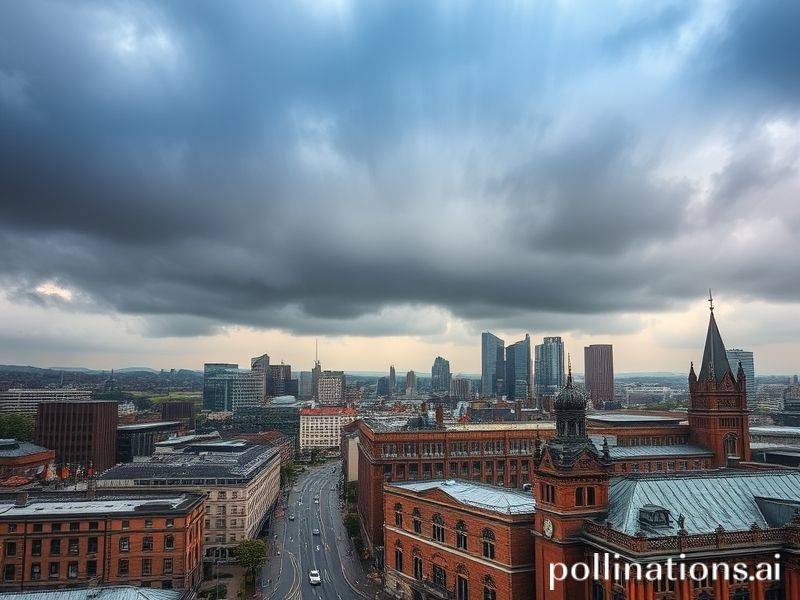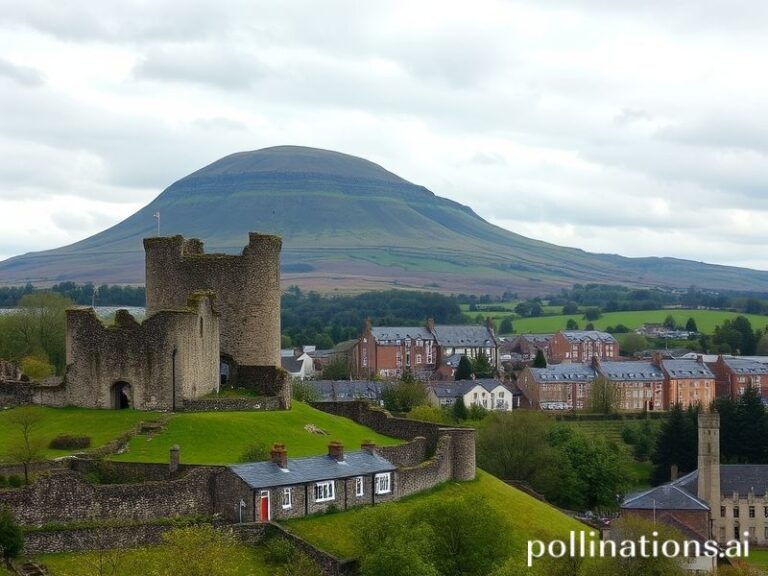weather birmingham
Birmingham, England—where the weather has always been a reliable punchline—recently delivered a masterclass in meteorological passive-aggression. A bruised-purple sky dumped golf-ball hail on the Bullring, flash-flooded the A38, and then sauntered off like a drunk who’s just keyed your car. Locals responded with the traditional stiff-upper-lip shrug: “Could be worse; could be Leeds.” Yet, from a planetary perspective, this soggy tantrum was more than provincial slapstick. It was a postcard from the future, forwarded through the jet stream and franked by climate bureaucracy.
Globally, 2023 was the hottest year since some Babylonian first thought, “Let’s record this for posterity.” Birmingham’s micro-apocalypse arrived the same week that Delhi hit 48 °C, Canada’s forests coughed smoke across the Atlantic, and Antarctica celebrated the Winter Solstice with a balmy -8 °C. Somewhere in Geneva, a UN climate negotiator bought another round of artisanal despair. The message is clear: if the planet were a pub, it’s now last orders and the landlord’s watering down the beer.
Still, Britain insists on treating weather as polite conversation filler rather than existential threat. The Met Office—our national augury service—issued an amber warning, which sounds like a pleasant ale but translates to “expect moderate inconvenience and dramatic social-media videos.” Meanwhile, insurance firms update actuarial tables with the enthusiasm of undertakers eyeing a gold rush, and property developers market “flood-resilient” basements the way 14th-century Italians marketed plague-resistant saints.
International investors watch from glass towers in Singapore and Dubai, where air-conditioned streets make weather a lifestyle choice. They hedge against Birmingham’s new liquid asset class: water where water shouldn’t be. Analysts at Goldman Sachs quietly rebrand storm surges as “blue-sky liquidity events.” Somewhere, a quant in Zurich packages rainfall futures into an ETF called DRIP. Capitalism, ever the quick-change artist, sees Noah’s Ark and asks about the IPO.
The geopolitical subtext is equally soggy. Britain’s post-Brexit trade deals now hinge on microchip exports and, increasingly, disaster-relief consultancy. The same civil servants who once negotiated cheese quotas now advise Jakarta on flood barriers. It’s a lucrative pivot: sell the world umbrellas during the drought, then sell them boats during the deluge. Empire 2.0 comes with gumboots.
Back on Corporation Street, pensioners queue for buses that never arrive because the depot is underwater. A teenager live-streams the chaos, monetizing misery with TikTok’s efficiency. Viewers from Lagos to Los Angeles send heart emojis—global empathy reduced to pink pixels. In the comments, a user in Siberia types, “At least your ice melts,” followed by a smiling devil emoji. Climate solidarity, 2024 edition.
Environmental psychologists call this “disaster fatigue,” the emotional hangover of scrolling through endless calamities. The brain, overwhelmed, files Birmingham’s floods under “Same Catastrophe, Different Postcode.” Meanwhile, the jet stream—once a reliable delivery route for mild Atlantic breezes—now behaves like a blackout drunk, wandering into the wrong hemisphere and picking fights with polar vortices. The atmosphere itself appears to be rage-quitting.
And yet, amid the sopping absurdity, human adaptability endures. A curry house on Stratford Road hands out free samosas to stranded commuters; the owner jokes it’s his “carbon offset program.” A brass band rehearses in a repurposed multi-story car park, their tuba notes ricocheting off concrete like optimism with nowhere else to go. These tiny acts of stubborn cheer are the real weather report: partly cloudy with a chance of collective denial.
Conclusion: Birmingham’s latest weather tantrum is not merely local inconvenience; it’s a synecdoche for a planet struggling to read the room. As the atmosphere grows more theatrical and our responses more transactional, the forecast remains grimly predictable—expect scattered outbreaks of resilience amid widespread institutional drizzle. Pack an umbrella, but maybe invest in arks. And if the sky does finally fall, remember: it’s already priced into the market.







